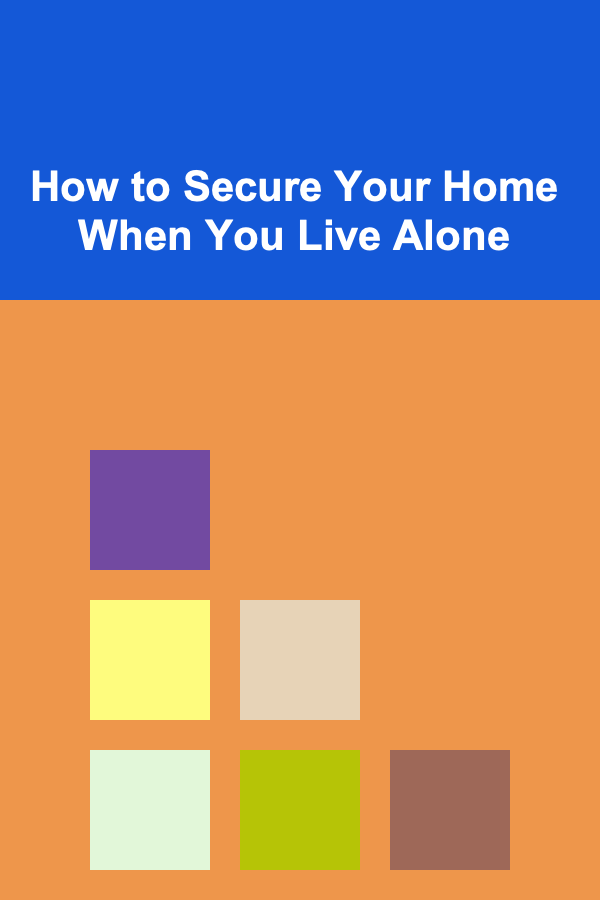
How to Secure Your Home When You Live Alone
ebook include PDF & Audio bundle (Micro Guide)
$12.99$7.99
Limited Time Offer! Order within the next:

Living alone can be a liberating experience. You get to set your own rules, enjoy your personal space, and have complete control over your environment. However, one of the concerns that often comes with living solo is home security. Without a second person to keep an eye out, it can sometimes feel like you're more vulnerable to break-ins, emergencies, or even everyday accidents.
Luckily, with advancements in technology and a few strategic changes, you can significantly improve the safety of your home while living alone. This guide will cover practical, effective steps to secure your home, from smart home systems to basic physical precautions, ensuring that you can feel safe, secure, and at peace in your own space.
The Importance of Home Security When Living Alone
Whether you're in an apartment or a house, living alone inherently carries unique security challenges. The primary reasons for this include:
- Lack of immediate help: If something happens, you're relying solely on yourself for help. There's no one around to intervene or call for assistance in case of an emergency.
- Increased vulnerability to intruders: Burglars often target homes they perceive as unoccupied or easy to break into, and living alone can make your home appear more inviting to thieves.
- Risk of isolation during emergencies: Whether it's a medical emergency or an accidental fall, living alone means you may not have anyone nearby to call for help or assist you in case of trouble.
Given these vulnerabilities, it becomes clear that enhancing home security should be a priority for anyone living by themselves. Fortunately, there are many ways to address these issues through technology, home improvements, and practical safety habits.
Upgrading Physical Security
2.1 Secure Doors and Windows
The first step in securing your home is ensuring that its entry points---doors and windows---are as secure as possible. Many home invasions occur through unsecured doors or windows, making it essential to reinforce these potential weak spots.
- Reinforce Entry Doors: Start by installing solid core or metal doors with heavy-duty locks. Standard hollow-core doors are easy to kick in, but a solid door can resist force far better. Additionally, install deadbolts with a one-inch throw, and ensure the strike plate is secured with 3-inch screws into the door frame for added strength.
- Use Reinforced Window Locks: Windows should be secured with strong locks. If your windows are sliding, consider adding a security bar or metal pin to prevent them from being easily opened.
- Install Peepholes and Smart Locks: A peephole or a smart doorbell camera allows you to safely identify who is at your door before answering. Smart locks can be programmed to give you remote access, ensuring you never accidentally leave your door unlocked.
2.2 Use Security Bars and Grilles
Security bars and grilles can be a highly effective deterrent, particularly for ground-floor windows. These physical barriers make it much more difficult for intruders to break in. They are especially useful in areas where you may not have a strong outdoor lighting setup.
- Window Bars: Secure window bars with locks or use decorative security grilles that still allow airflow and natural light.
- Security Screens: For areas with frequent foot traffic or where windows open directly to the outside, consider security screens designed to withstand tampering or forced entry.
2.3 Improve Outdoor Lighting
Darkness provides cover for potential intruders. By installing effective outdoor lighting, you can eliminate areas around your home that might otherwise go unnoticed by neighbors or passersby. Motion-sensor lights are particularly useful because they can be triggered by movement, surprising and alerting anyone who may be loitering around your home.
- Install Motion-Sensor Lights: Place them around doors, windows, and pathways. They will illuminate anyone attempting to approach your house, making them less likely to proceed with their plans.
- Light Up Your Entire Yard: Ensure that all dark corners around your home are well-lit. Thieves and burglars tend to avoid well-lit areas.
Implementing Technology for Home Security
One of the most effective ways to enhance security while living alone is by integrating smart technology into your home. These systems allow you to monitor your home remotely, receive instant alerts, and control your security features at the touch of a button.
3.1 Install a Smart Security System
A smart security system is a great way to protect your home and receive alerts when something suspicious occurs. These systems can be integrated with your smartphone, allowing you to check in on your home from anywhere in the world. Here are some components of a smart home security system:
- Security Cameras: Install cameras around your home, particularly near entrances. Look for systems with live streaming, motion detection, and night vision. Many smart cameras also offer cloud storage for footage, allowing you to review past activity.
- Smart Motion Sensors: Motion detectors that send alerts to your phone whenever they detect movement can be vital for early warning. You can use these sensors both inside and outside your home.
- Smart Doorbell: With a smart doorbell camera, you can see who is at your door in real time, even if you are not home. Many of these systems also allow you to communicate through two-way audio, which can discourage unwanted visitors.
3.2 Use Smart Locks and Keyless Entry Systems
Gone are the days of fumbling with keys. A smart lock system allows you to control access to your home without the need for traditional keys. You can lock and unlock your doors remotely, provide temporary access to guests, and even receive alerts when someone enters or exits.
- Keyless Entry: These systems use codes, fingerprints, or smartphone apps to gain access to your home.
- Automatic Locking: Some systems allow your door to automatically lock when you leave, reducing the risk of accidental entries.
3.3 Set Up a Home Automation System
In addition to security features, a home automation system can help create the illusion that someone is home, even when you're not. This is especially useful for deterring burglars who may target homes that appear unoccupied. For example, you can set up:
- Automated Lighting: Program your lights to turn on and off at certain times, mimicking your usual routine.
- Smart Curtains or Blinds: Schedule your curtains or blinds to open and close at specific times, making it harder for outsiders to know whether you are at home.
Build Strong Relationships with Neighbors
Living alone doesn't mean you have to face security concerns in isolation. Building relationships with neighbors can be one of the most effective ways to secure your home. Your neighbors can serve as an extra set of eyes, alerting you or the authorities to anything suspicious.
- Get to Know Your Neighbors: Introduce yourself to the people living around you. Having a network of people who look out for one another can increase the security of your neighborhood.
- Set Up a Neighborhood Watch Program: Many communities have neighborhood watch programs where residents work together to monitor suspicious activity. Even a simple text group with neighbors can help increase awareness and response to security threats.
- Share Emergency Information: Let neighbors know how they can reach you in case of an emergency, and provide them with any necessary details for keeping your home safe when you're away.
Personal Safety Habits
Aside from physical and technological improvements, personal safety habits are key to reducing your risk. These habits can include everything from staying aware of your surroundings to making sure your home is always locked up properly.
5.1 Stay Vigilant About Locking Doors and Windows
It may seem simple, but many break-ins happen because doors or windows are left unlocked. Always ensure your home is securely locked before leaving, especially at night. This includes deadbolts, window locks, and securing sliding doors with a bar or pin.
5.2 Avoid Broadcasting Your Absence
In the age of social media, it's tempting to share everything with your online followers. However, posting real-time updates about being away from home can inadvertently inform burglars that your house is empty. Avoid sharing detailed plans or current locations in public forums.
5.3 Keep Emergency Numbers Handy
It's essential to keep a list of emergency numbers within easy reach. Whether it's for fire services, the police, or a trusted friend or family member, having these numbers saved on your phone and posted somewhere visible in your home can save valuable time in the event of an emergency.
Final Thoughts
Securing your home when you live alone is all about being proactive and prepared. With the right physical security measures, technological tools, and personal safety habits, you can create a protective environment that minimizes risk and maximizes your peace of mind.
Remember, a secure home is not just about locks and alarms; it's about creating a safe space where you can live freely without constantly worrying about threats. By following the strategies outlined in this article, you can confidently enjoy the benefits of living alone without compromising your safety.

How to Find Free Resources for Budgeting Help
Read More
How to Make Money Online as a Brand Ambassador: 10 Actionable Ideas
Read More
How to Manage Risk in Your Personal Investment Strategy
Read More
How to Manage Student Loan Debt While Building Your Career
Read More
How to Use Shelving Wisely to Maximize Small Spaces
Read More
How to Use Ziplock Bags for Fishing Gear Protection
Read MoreOther Products

How to Find Free Resources for Budgeting Help
Read More
How to Make Money Online as a Brand Ambassador: 10 Actionable Ideas
Read More
How to Manage Risk in Your Personal Investment Strategy
Read More
How to Manage Student Loan Debt While Building Your Career
Read More
How to Use Shelving Wisely to Maximize Small Spaces
Read More